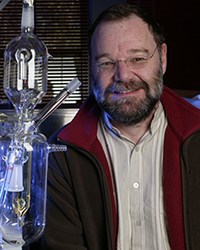Professor Anthony Dean talks about his part-time faculty appointment in Southern China.
Tony Dean (EEB/BTI) recently accepted a part-time post at Sun Yat-sen University in Guangzhou, China, where he will set up a second research lab in addition to his current lab at the University of Minnesota. Here, he talks about the excitement and adventure of moving to China, along with some of the challenges he will face. Q: How did you become involved with Sun Yat-sen University?
I was talking to my father about my difficulties maintaining funding for my current research in the United States, and he suggested that maybe I should look at moving to a different country. He had a similar experience in England and had actually moved to Thailand for a while. I started looking around and applied for an award called the “Thousand Talents” award. The purpose of this award is mostly to attract Chinese talent back to China, but I got it even though I am not Chinese! So, I thought, ‘Why not?’ Then, the question was finding the right place to land. I ended up in Guangzhou for a number of reasons. I know professors there -- professors who have worked at American and Canadian universities -- and I have some former postdocs there. I go over every now and then to give lectures there. I’m also doing it for the sense of adventure! Q: What do you envision your research and teaching opportunities will look like at Sun Yat-sen?I’m going to see what I can do out there. I am interested in returning to some previous studies about population competition in two dimensions of space. These studies would require a high-throughput liquid handling robot, a piece of equipment commonly used for drug studies and not so much in population genetics. The studies I am hoping to do there are very different from my work here, which is mostly on protein evolution. I will be doing some teaching, but I am not sure if it will be undergraduate or graduate. I have been told I can actually assign someone to do my teaching for me. If I teach an undergraduate class, I will probably give a few lectures in English and then have someone else give the rest in Chinese, but the graduate school is entirely in English. If I am teaching graduate students, it will be in English. I just hope their answers to my questions are also in English! As far as students in my lab, getting graduate students in China is much different than it is here. In China, students are assigned to your lab. Q: How do you feel about moving to China part-time?I’m not looking forward to the transition. It’s going to be an absolute nightmare! The traveling to and fro, running two labs on two different continents is going to be quite difficult. I don’t know whether I can do it, but I’m going to try. On the other hand, China is opening up very rapidly. China wants to really improve its universities, and to have big research universities like the United States does. Through having had experience here, I think I can bring that kind of experience to China. Being able to contribute to something bigger than just my own lab is something that appeals to me very much. The other major motivating factor is that Guangzhou is in subtropical China, so you know where I’m going to be in January and February! They have palm trees on campus. This I like. — Diedre Ribbens |
